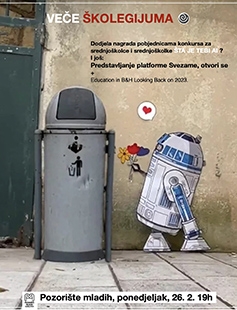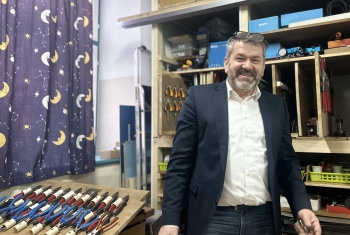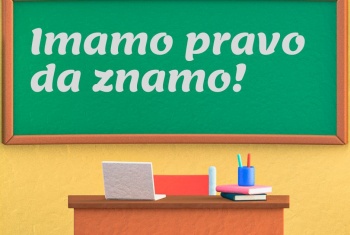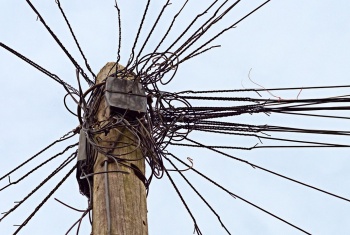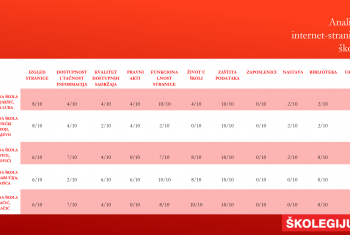The proposal for the Statute of the University of Sarajevo has 126 pages, and its internal public discussion is currently being finalized. I was invited to comment on it through various channels. Being a full professor, I am officially expected to complete the document on Instructions for filling out the form for proposal, remarks, and comment submission.
I'm not a legal expert and I don't have the attention span to read such long documents. Had the proposer laid out why he thinks we need the new statute, how it differs from the old one, what its changes or novel elements are, and what they achieve in an understandable language over several concise pages, I would have felt obliged to complete the task.
If we had the answers to these questions, we could discuss the ideas and shared values that should bind us. We could also point out discrepancies between what is (declaratively) wanted and what is (concretely) written. Finally, we could anticipate a vision of the development and role of the University.
All this can be done even without those few honest, collegial and academic pages of explanations. It would just be tiring, and at times hopeless, like standing in front of a tank in Tiananmen Square.
The form, as it is now, does not foresee questions. For example, why is there not a single sentence in the Statute about academic jurisdiction[1]? Is it an oversight, or another confirmation that this Statute, as well as the Law that preceded it, comes to us at the tail end of a political action called the integration of the University? Political action, in the sense that the goal is to control resources, and not to organize academic work for the sake of efficiency and rationalization.
I believe the latter is true, but perhaps the creator of this Statute disagrees. If they feel called out, here is another question for them: Why does the Statute give an honorable/privileged place in its preamble to theological institutions? What exactly is meant for the continuity of scientific work when a line is drawn from Gazi Husrev-bey's endowment through the Sharia Judge School, the Catholic and Sarajevo-Relej seminaries to the university in today's sense of the word? I understand that it is attractive to stretch the tradition of the institution founded in 1949 as close as possible to Bologna's 1088 and inflate one’s own biography, but why exactly in the preamble? Not to mention the autonomy of the university, which is being undermined in several places when both theological faculties are privileged since joining the University only a few years ago. Orwell would say that all faculties of the university are equal, but some are more equal than others. After all, who cares about the details, I wrote about them in the book Academic Charlatanism (original, Akademsko šarlatanstvo).
The Statute is, of course, adopted in accordance with the Law. The law went through the same formulated discussion, in which “everyone was invited to participate.’’ Now it is already meaningless to ask why SPUS (Student Parliament of University in Sarajevo) as a citizens' association is a better solution for representing students than a University organization. That other organization would perhaps interact with the public differently, and the latest news on its website probably would not have been from September 10, 2022 (last recorded at the time of writing of this article, March 14, 2023). It is also somewhat strange that in the rhetorical abundance of care for students, their health does not appear anywhere: how did the Student Polyclinic disappear from the Statute? It is equally futile to ask why the children of martyrs and fallen fighters are still exempted from paying the registration fee and why the Statute’s creator thinks that this does not unnecessarily complicate the issue of the obligation to prevent any form of discrimination.
Also, nowhere in the Statute is there any mention or idea of founding alumni organizations at the faculties. I, for one, cannot imagine a better method of (self) evaluation of academic work than speaking with former students, either successful or unsuccessful, who after many years of experience in the labor market certainly know what could be done differently in the process of higher education to improve it.
I paused a bit while reading the advancement criteria[2], never elaborated in more detail than in this draft. It mentions, among other things, participation in the organization of renowned foreign art music festivals (sic!). However, what about theater, film, literary festivals, biennials...? And there is also a caricatured attempt to relieve advancement candidates from the obligation to write books. So, I guess, the justified reason is that… there is no need for books… Since I'm talking about academic advancements: I don't understand what happens when the faculty council's decision on the selection is negative. Does the senate discuss it or not (Articles 250 and 251)?
Even though the unedited version of the Statute was presented at the hearing, there are problematic wordings. E.g.: The faculty/academy council is competent to make a decision (…) within its jurisdiction... If I had more patience, time and better experience with previous internal public hearings, I could perhaps squeeze out of this superficiality at least a few drops of the politics behind this entire campaign.
[1] Matičnost, literally translated as parentage, in BH academia presents a central place for decision making within each academic discipline. However, this academic jurisdiction isn't centralized, and thus, BH doesn't have a concrete division of responsibility among departments. This complicates any professional development within academia and changes in teaching plans because decision making boards are fragmented throughout faculties.
[2] Advancement criteria in BH context is criteria for candidates for promotion to the rank of (full or tenured) professor, usually characterized by a high level of professional distinction through research and high standards in teaching.








